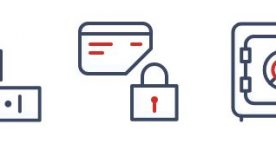Never share your password they say. But what happens if someone needs it in a hurry? A lot of our online life is saved behind login details, for example, banking details, photos, emails, usernames and passwords to other accounts. I couldn’t even list all my online accounts.
I use a service called LastPass to keep all my login details safe and secure. But if I pass away or become unable to remember my password for LastPass then I or my executors have a problem.
What have I done
I’ve simplified my password world to remembering two passwords, one to log me into my laptop and one to get me into my LastPass. From there I can log into all my online accounts without knowing the passwords for any of them! This is great. Apart from these two, I don’t know any of the passwords. What happens if I need them in a hurry? What if someone else needs them? What if I’ve passed away and my family wants to save the literally 10,000s of photos I’ve taken…? Here’s what I’ve done:
- Written down my essential passwords in a safe place (Email account, Laptop, smartphone and LastPass passwords)
- I also have 2-factor set up on those accounts so I have a backup code printed out and stored safely too – more on this below.
- Given one of my friends access to my password vault, LastPass (I have a couple of days to decline their request to see my passwords if they do it by mistake)
- Talked to my parents and friends about it so they know where to look if they need things in a hurry.
- Given my parents’ phone number to my friend, and my friend’s number is written on the emergency backup pack at my parents.
What about writing down your passwords in your will?
I was talking to my dad about the possibility of saving your passwords in your will so your loved ones can get to all your online accounts or into your tablet if they want some photos off it. It seems like a good idea. Dad made the point that passwords can change over time and updating a will can be costly and add confusion. Who needs to understand what a codicil is, let alone add one just because a password has been changed?! So, it might be better to put a note in the will that says where to find the passwords, probably best to keep it factual rather than cryptic! “If the password to my laptop is what ye seek, then look where the water may leak”, is not very helpful, but writing something like “My password book is saved in a tin under the sink in the kitchen” is more helpful and less like a 1930s horror movie.
Other ways to share passwords.
I use LastPass to store my passwords and make sure my family and friends can get them when I’m gone, and I’d encourage you to use a Password Manager too. But they are not for everyone, so here are some other, less secure ways:
- Password book, literally write your passwords down, I’d recommend writing down at least your email, laptop/tablet/smartphone and Password Manager passwords. Keep them safe! For example, keep them in a safe deposit box with keys that the will executors can access. It really depends on how sensitive your online accounts are.
- Tell a friend your password (riskier, they need to keep it safe then). Or you could tell two friends 2 halves of your password, that way they need to be together to use the full thing. I don’t recommend this, though – it’s confusing.
Practical steps:
- Write down your main passwords including your laptop, tablet, phone, password manager, and email password and put them somewhere safe.
- Leave a clear note in your will or somewhere else telling your family where to find the passwords. Or if you want just one family member to know, you could leave an envelope with the details in alongside your will at your solicitors.
- If you have any special instructions, make sure you include these in the will. For example, you might want your Facebook account ‘memorialised’^. Or you might want to leave a note about some photos in your Google/Apple iCloud account that you want your family to save.
- Consider pre-warning someone that you’ve done this. I’ve talked to my parents and my friend about it so it’s not a surprise. In the case of sharing my LastPass login with a friend, I’ve already set this up. And remember they have to agree to this, so you do need to speak to someone first if you go down this route.
- If you change your passwords, remember to update the one you have written down.
Extra steps:
- Google Inactive Account: You can set your Google Account to grant someone access to your Google Account after a set time of you not using it. This includes access to Google emails and Google Drive, Photos etc… You can read more about this here.
- LastPass can be set up to give access in an emergency. Much like Google inactivity alerts LastPass can be set up to allow a friend to get into your account. The way it works is a bit different from Google. First your friend requests access, then you get an email. If you don’t click the link in the email then a few days later your friend can login to LastPass and see all your passwords in there.
- Other services might offer a similar system, if you use something and would like us to look into it for you just drop us a note.
What about 2-factor login?
2-Factor, sometimes called Multifactor, is a system that allows online accounts to have two checks when you log in. The first check is your username and password and the second check could be a text message, or a code generated on your phone. This adds an extra level of security to your account but can complicate things if someone other than you is trying to log in.
In my backup pack, I have printed backup 2-factor codes for everything so my friend has my passwords and my parents know where the 2-factor codes are. I’ve made sure that my parents know how to contact my friend (and the other way around!)
Disclaimer
Remember, changing a will should be done only after seeking legal advice. I must emphasise that this article is not advice. I’ve seen many episodes of ‘Murder, She Wrote’ and ‘Columbo’ and believe me, a challenged will is not something you want to leave your loved ones with!
I’ve talked a lot about LastPass here, there are other password managers like OnePassword, these have a similar feature for sharing your account in an emergency.
^ Read more about what a memorialized Facebook account is on the Facebook help page here
Photo by Natasya Chen on Unsplash





